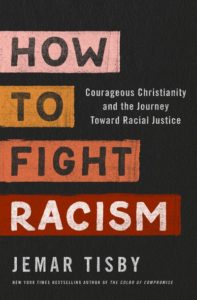
How to Fight Racism: An Interview with Jemar Tisby
 Jemar Tisby generated a lot of necessary conversation about the intersection of race, social justice, and the global church in 2019 with his best-selling book, The Color of Compromise. With that book, he laid the historical foundation of racism in the church. In the last chapter of the book, Tisby shares practical tips for fighting racism. In his new book, How to Fight Racism, Tisby continues the conversation, but this time around he provides an actual framework that churches and Christian groups can use toward racial reconciliation.
Jemar Tisby generated a lot of necessary conversation about the intersection of race, social justice, and the global church in 2019 with his best-selling book, The Color of Compromise. With that book, he laid the historical foundation of racism in the church. In the last chapter of the book, Tisby shares practical tips for fighting racism. In his new book, How to Fight Racism, Tisby continues the conversation, but this time around he provides an actual framework that churches and Christian groups can use toward racial reconciliation.
“In a lot of ways, they [the books] pair together really well. Now, they can be read independently of each other. So, I don’t want folks to get scared if they didn’t read the first one. You can dive into the second. From my perspective, the second book is what I wanted to be the first book. I was really passionate about getting in there, getting involved in doing something about racism. But in conversations with publishers and advisors and things like that, it became apparent that we really needed to lay the groundwork for the problem of racism and white supremacy in this country. Especially as it relates to the church. And basically, diagnose the problem before we jumped to solutions,” said Tisby.
Tisby’s solution is built around a model he created called the ARC of Racial Justice. ARC is an acronym for awareness, relationships, and commitment. From Trayvon Martin through the Black Lives Matter Movement and even the tumultuous racial conflicts during the Trump presidency, many people have become more acutely aware of our country’s problems centered around race. But committing to developing relationships with people who may not have the same views as you do or are coming from a different cultural perspective and, in doing so, breaking down racist structures takes more of a plan for change.
“What I’m hoping for is that this sparks ideas for people to gather a group of folks around them and say, ‘Hey, let’s do something.’ And I am really looking forward to stories trickling in over the next year and two years or whatever, so that when we do the updated and revised version of How to Fight Racism, I can include stories from the field, so to speak,” Tisby said.
 So, what about Critical Race Theory (CRT) as a way to combat racism? CRT argues that diversity training and changes in the laws are needed to combat structural obstacles created by white people that make for an unequal playing field in our society when it comes to people of color. Some people believe that CRT is a huge threat to the church. Tisby doesn’t see it that way. He says people who are dismissing it are using an old tactic — from tactics during the Civil War, when pro-slavery people used terms like “carpetbaggers” and “scallywags,” to the Jim Crow segregationists’ labels of “outside agitators,” to modern usages of Red Scare smears of “communists” and “Marxists.” Now, the label is “Critical Race Theory” proponents and is being used by people whom Tisby says want to defend a racist status quo.
So, what about Critical Race Theory (CRT) as a way to combat racism? CRT argues that diversity training and changes in the laws are needed to combat structural obstacles created by white people that make for an unequal playing field in our society when it comes to people of color. Some people believe that CRT is a huge threat to the church. Tisby doesn’t see it that way. He says people who are dismissing it are using an old tactic — from tactics during the Civil War, when pro-slavery people used terms like “carpetbaggers” and “scallywags,” to the Jim Crow segregationists’ labels of “outside agitators,” to modern usages of Red Scare smears of “communists” and “Marxists.” Now, the label is “Critical Race Theory” proponents and is being used by people whom Tisby says want to defend a racist status quo.
“All of these things are about controlling the narrative. And what happens is, if I can use a label like Critical Race Theory, I can paint it as bad, slap you with it. Then I can put you in a box, put you on the shelf, and I don’t have to actually listen to what you’re saying about racism and white supremacy,” Tisby said. “What we have to do is not get distracted from the main issue, which is Christian nationalism. It has infected so many parts of the church in the U.S. and even beyond.”
Many white Christians don’t experience racism the same way as Black people and other people of color because the Christian nationalists are in their families, in their churches, and some cases, they’ve acclimated to that way of thinking. Tisby says it’s hard for them to see it as an urgent existential problem that the marginalized and oppressed people do. That said, he has noticed that the social justice marches and movements have had an impact. White women in particular, from a 30-something who teaches Bible study at a nursing home to 70-year-old women, have reached out to him via social media and seem catalyzed to start taking action.
“It might’ve had to do with the past year or two and what they saw, especially politically. White Christians are starting to realize, ‘Oh my, like these differences are real. They’re salient. They’re in my church. They’re in my family,’” Tisby said.
It’s no easy task to be as explicit as Tisby directs white Christians about calling out Christian nationalism and white supremacy in their ranks. We know how it’s infected historically and theologically what they do. He often praises Fannie Lou Hamer’s efforts, who became a nationally known civil rights activist after seeing a presentation about voting rights at her church. Tisby admires how she always connected her activism to her faith. With that in mind, what should Black Christian activists be doing now?
“We are going to have to protect our peace. We are living in perilous times right now. And I find myself even just scrolling through Twitter or social media and whatnot, that I’ve got to take breaks because the flood of negative news, the flood of anti-Blackness, all of that stuff is too much to handle all at once. So, we will have to cultivate communities that affirm our dignity, that affirm our being made in the image of God. You got to go out and seek it and find it.”


